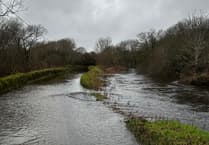SHOCKING footage taken on the M4 shows an HGV driver holding two mobile phones, one to each ear.
The driver didn’t realise that the vehicle travelling alongside was an unmarked National Highways ‘HGV cab’ – and there were two police officers inside.
The footage, taken between junctions 18 and 17 by Avon and Somerset Police, captures one of over 21,000 offences recorded by officers in the Operation Tramline HGV cabs since the national safety initiative was launched by National Highways, formerly Highways England.
The National Highways HGV cabs are now being used as part of a multi-agency fortnight of action along the M4 and M5, Operation Peninsula, taking place from Monday 13 September to Sunday 26 September, which aims to reduce the number of incidents on the motorways and highlight the risks of dangerous driving.
Elsewhere in the South West, a truck driver who initially provided false details to Devon and Cornwall Police during an operation last month was later identified as disqualified and arrested, while Wiltshire Police caught a motorist speeding at 121mph along the M4 during a four-day operation
Devon and Cornwall Police’s July operation recorded:
Seven people driving without a seat belt
15 driving while using a mobile phone at the wheel
Two positive cases of drug driving
66 offences in total, including 10 speeding and four drivers with no insurance.
National Highways says it deals with countless incidents on the M5 and M4 motorways. Since the launch of Operation Tramline in 2015, more than 21,600 offences have been recorded on the National Highways motorway network. The most common offences have included:
• Using a mobile phone – 6,073
• Not wearing a seatbelt – 6,253
• Not in proper control of vehicle – 1,501
• Speeding – 1,199
In total, 19,564 vehicles have been stopped in Operation Tramline between July 2015 and April 2021. In that time, a number of bizarre and dangerous behaviours have been spotted, including a driver eating lasagne with a knife and fork while driving along a motorway, and an HGV driver boiling a kettle on the dashboard.
Nicholas Reed, National Highways’ Road Safety Lead for the South West, said: “The HGV cabs are an important part of our commitment to tackling unsafe driving and those who take unnecessary risks with their own safety and that of others on the road.
“The number of people found using their mobile phone while driving is quite alarming. You are four times more likely to be in a crash if you use your phone and, if caught, face a £200 fine and six points on your licence.
“Through this fortnight of action on the M5 and M4 we want to make all of our roads safer by raising awareness and encouraging motorists to consider their driving behaviour.”
From their elevated viewpoint in the unmarked HGV cabs, police officers are able to spot people driving dangerously – whatever vehicle they may be in.
Consequences for the drivers range from warnings to fixed penalty notices, court summons or even arrest.
In addition to the operational patrols, partners taking part in Operation Peninsula will be present at motorway services along the M5 and M4, offering advice to drivers such as what to do in a breakdown and ensuring load safety.
National Highways’ traffic officers will be providing free tyre checks and safety tips, and vehicle checks will also be carried out by the DVSA (Driver and Vehicle Standards Agency) at various locations along the M5 and M4.
Four regional forces are taking part in Operation Peninsula – Gloucestershire, Wiltshire, Avon and Somerset and Devon and Cornwall – and the Devon and Somerset Fire Service will also be playing a part during the road safety fortnight.
Nina Day from the Health and Safety Executive’s Transport Sector, said: “Employers must ensure that drivers, other workers, and members of the public are kept safe when vehicles are used for work.
“There are legal requirements for employers to have robust procedures in place to manage vehicle safety, including ensuring suitable procedures are in place, providing workers with appropriate training and equipment, maintaining equipment and vehicles, and supporting drivers when they raise concerns.
“HSE works closely with our partner agencies to help vehicle operators and load consignors understand their legal responsibilities.”




